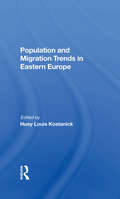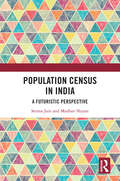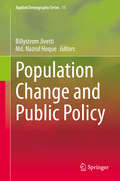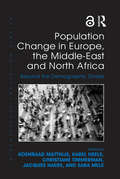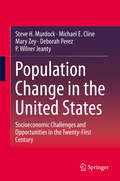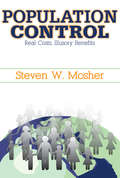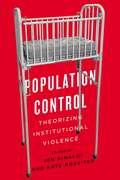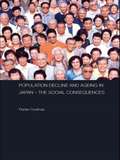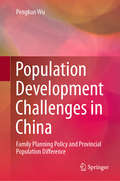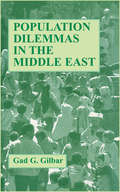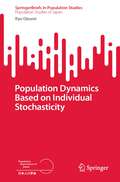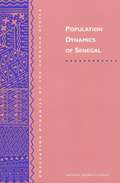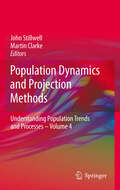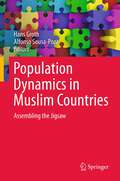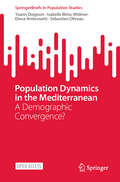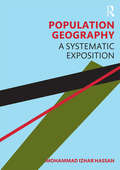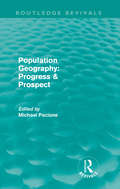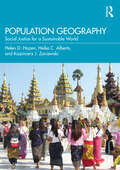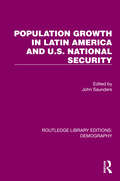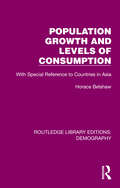- Table View
- List View
Population And Migration Trends In Eastern Europe
by Huey L KostanickEastern Europe is undergoing broad changes in demographic structure that have widened the ranges of population growth between countries and have created new problems of worker movement. This book, the result of a conference on demography and urbanization in Eastern Europe, contains both broad theoretical and conceptual essays and specific analyses
Population Census in India: A Futuristic Perspective
by Seema Jain Madhav ShyamThe population census is the primary data source for any demographic analysis, the execution of social and economic development programmes, administrative activity, as well as for policy decisions, special surveys and scientific research. This book critically analyses key facets of pre-census activity, including its timing, duration and method of enumeration. It traces concepts and definitions adopted by the census of India back to its beginning in 1872. The authors also study themes such as census legislation, census organisation, administrative setups, training strategies, the instruction manual and the impact of COVID-19 on the census.The volume will be indispensable for students and researchers of population studies, history, development studies, human geography, anthropology, public policy and governance, migration studies and South Asian studies. It will also be useful for planners and policymakers.
Population Change and Impacts in Asia and the Pacific (New Frontiers in Regional Science: Asian Perspectives #30)
by Jacques Poot Matthew RoskrugeThis volume brings together a range of contributions that provide contemporary regional science perspectives on population change and its socio-economic consequences in the Asia-Pacific region. This region accounts for close to two-thirds of the world’s population and is highly diverse in terms of key demographic indicators such as population size, growth, composition and distribution. The authors provide quantitative assessments, either descriptively or by means of modelling, of important demographic issues affecting this part of the world.The topics addressed include: broad demographic trends across the Asia-Pacific region and its sub-regions; assessment of population decline, urbanization and spatial distribution using cases from China, Colombia, Japan and Australia; migration and economic impacts in Australasia, Chile and Timor Leste; and the impacts of declining or low fertility and population ageing in China, India, Thailand, and across Asia.Given its scope, the book will appeal to all readers seeking to understand population change and impacts across the Asia-Pacific region, with a specific focus on sub-regional differences and dynamics.
Population Change and Public Policy (Applied Demography Series #11)
by Billystrom Jivetti Md. Nazrul HoqueThis book provides a solid empirical portrait based on the complexities of demographic components of population change. It describes recent innovations, trends, challenges and solutions to population change and public policy issues, such as but not limited to immigration, gender discrimination in the labor market, student housing, teen pregnancy programs, smoking and alcohol consumption, and environment and self-rated health. As such it provides an interesting platform for academics, researchers, policy makers, and students to explore experiences and research findings on special topics in applied demography and how those inform the field of population studies and public policy.
Population Change in Europe, the Middle-East and North Africa: Beyond the Demographic Divide (International Population Studies)
by Christiane Timmerman Jacques Haers Koenraad Matthijs Karel NeelsCurrent demographic trends raise new questions, challenges and controversies. Comparing demographic trends in Europe and the NAME-region (North Africa and the Middle East), this book demonstrates how population change interacts with changing economic landscapes, social distinctions and political realities. A variety of drivers contribute to demographic change in the various regions and countries considered, such as family policies, economic realities, the impact of educational differentials and the attitudes towards marriage. On the macro-level the new trends are restructuring the age composition of populations and are reshaping the life courses of individuals and families. In turn, the impact demographic forces have on the organisation of labour markets, on fiscal policies, on the care of the elderly, on migration flows and on political changes can be quite radical. The volume provides food for thought for those who are looking for a nuanced perspective on the background and future perspectives of demographic developments in Europe, for a discussion of recent demographic and political realities in the NAME countries, and for those who analyse the effects of contrasting demographic regimes on migration flows to and migration politics in Europe. Chapter 1 of this book is freely available as a downloadable Open Access PDF at http://www.tandfebooks.com/page/openaccess. It has been made available under a Creative Commons Attribution-Non Commercial-No Derivatives 3.0 license.
Population Change in the United States
by Steve H. Murdock Michael E. Cline Mary Zey Deborah Perez P. Wilner JeantyThis new volume maps the complex interplay of demographic and socioeconomic changes in the United States, where rapid aging and ethnic diversification are merely the most salient of the many issues with major long-term implications. Drawing on The United States Census Bureau's post-2010 detailed projections, as well as a wealth of data distilled from authoritative sources, the authors tackle many of the urgent policy questions raised by America's changing population. The book explores the ways economic markets are adapting to an older and more diverse customer base, how the projected demographic change will impact public service demand, the growing economic disparities between asset-rich baby boomers and youth struggling for economic security, and how the projected demographic patterns will change the fiscal, economic, education, health, and housing sectors and alter the social structures and processes impacting American households and the diverse array of America's future population. A thorough survey of major demographic patterns in the USA up to 2050 is followed by an assessment of how these will affect socioeconomic, public service, fiscal, economic, and social structures and mechanisms, down to the size and composition of households. The analysis then considers possible variations of outcome predicated on alternative dynamic patterns between demographics and socioeconomics. Cutting through the politics and communal anxieties with hard, cutting-edge data, this study will be a primary source for all those who must use its contents to guide their decisions.
Population Control: How Corporate Owners Are Killing Us
by Jim MarrsFrom the food we eat, the water we drink to the air we breathe, everything these days seems capable of killing us. Recently we have seen an unprecedented number of deaths due to medications for diseases that may not even exist, obscure cancers caused by our modern devices, and brutal police tactics. All a coincidence? Think again. In Population Control, acclaimed journalist Jim Marrs lays out a stunning case for his most audacious conspiracy yet: the scheme concocted by a handful of global elites to reduce the world’s population to 500 million by whatever means necessary and make a profit from it.Marrs, the bestselling author of Rule by Secrecy and The Trillion Dollar Conspiracy, pulls no punches in exposing this evil and chillingly effective plan. He explains how a small group of tremendously wealthy and powerful people control virtually every important industry – guns, oil, pharmaceuticals, food, and of course the media – and how it uses this vast network of conglomerates to take actions that lead to the deaths of men and women all over the world.In the explosive Population Control, Marrs lays bare the damning truths corporate owners don’t want you to discover: how they’ve spied on private citizens, intentionally spread disease, and destroyed the planet chasing profits, all to improve the lives of a privileged few while eliminating everyone else. Finally, he offers a citizen’s blueprint for fighting back.
Population Control: Real Costs, Illusory Benefits
by Steven W. MosherFor over half a century, policymakers committed to population control have perpetrated a gigantic, costly, and inhumane fraud upon the human race. They have robbed people of the developing countries of their progeny and the people of the developed world of their pocketbooks. Determined to stop population growth at all costs, those Mosher calls "population controllers" have abused women, targeted racial and religious minorities, undermined primary health care programs, and encouraged dictatorial actions if not dictatorship. They have skewed the foreign aid programs of the United States and other developed countries in an anti-natal direction, corrupted dozens of well-intentioned nongovernmental organizations, and impoverished authentic development programs. Blinded by zealotry, they have even embraced the most brutal birth control campaign in history: China's infamous one-child policy, with all its attendant horrors. There is no workable demographic definition of "overpopulation." Those who argue for its premises conjure up images of poverty - low incomes, poor health, unemployment, malnutrition, overcrowded housing to justify anti-natal programs. The irony is that such policies have in many ways caused what they predicted - a world which is poorer materially, less diverse culturally, less advanced economically, and plagued by disease. The population controllers have not only studiously ignored mounting evidence of their multiple failures; they have avoided the biggest story of them all. Fertility rates are in free fall around the globe. Movements with billions of dollars at their disposal, not to mention thousands of paid advocates, do not go quietly to their graves. Moreover, many in the movement are not content to merely achieve zero population growth, they want to see negative population numbers. In their view, our current population should be reduced to one or two billion or so. Such a goal would keep these interest groups fully employed. It would also have dangerous consequences for a global environment.
Population Control: Theorizing Institutional Violence
by Jen Rinaldi, Kate RossiterViolence is an inescapable through-line across the experiences of institutional residents regardless of facility type, historical period, regional location, government or staff in power, or type of population.Population Control explores the relational conditions that give rise to institutional violence – whether in residential schools, internment camps, or correctional or psychiatric facilities. This violence is not dependent on any particular space, but on underlying patterns of institutionalization that can spill over into community settings even as Canada closes many of its large-scale facilities. Contributors to the collection argue that there is a logic across community settings that claim to provide care for unruly populations: a logic of institutional violence, which involves a deep entanglement of both loathing and care. This loathing signals a devaluation of the institutionalized and leaves certain populations vulnerable to state intervention under the guise of care. When that offer of care is polluted by loathing, however, there comes along with it an unavoidable and socially prescribed violence.Offering a series of case studies in the Canadian context – from historical asylums and laundries for “fallen women” to contemporary prisons, group homes, and emergency shelters – Population Control understands institutional violence as a unique and predictable social phenomenon, and makes inroads toward preventing its reoccurrence.
Population Decline and Ageing in Japan - The Social Consequences (Routledge Contemporary Japan Series)
by Florian CoulmasThis book presents a comprehensive analysis of one of the most pressing challenges facing Japan today: population decline and ageing. It argues that social ageing is a phenomenon that follows in the wake of industrialization, urbanization and social modernization, bringing about changes in values, institutions, social structures, economic activity, technology and culture, and posing many challenges for the countries affected. Focusing on the experience of Japan, the author explores: how Japan has recognized the emerging problems relatively early because during the past half century population ageing has been more rapid in Japan than in any other country how all of Japanese society is affected by social ageing, not just certain substructures and institutions, and explains its complex causes, describes the resulting challenges and analyses the solutions under consideration to deal with it the nature of Japan’s population dynamics since 1920, and argues that Japan is rapidly moving in the direction of a ‘hyperaged society’ in which those sixty-five or older account for twenty-five per cent of the total population the implications for family structures and other social networks, gender roles and employment patterns, health care and welfare provision, pension systems, immigration policy, consumer and voting behaviour and the cultural reactions and ramifications of social ageing.
Population Development Challenges in China: Family Planning Policy and Provincial Population Difference
by Pengkun WuThis book explores the population development challenges in China. It started by analyzing two of the major challenges: designing a suitable family planning policy and dealing with the serious provincial population difference. It then proposes effective measures to address these challenges by adopting various quantitative methods, such as system dynamics, nonlinear programming and spatial econometrics in evaluating the effects of different policy scenarios, which made the results more scientific and reliable, thus the final policy suggestions effective and evidence based. The book includes a number of mathematical models and is suitable for graduate students and researchers in population modeling and relevant research areas.
Population Dilemmas in the Middle East
by Gad G. GilbarThis study provides a general outline of Palestinian population growth between 1948 and 1987 and then focuses on the town of Nablus for a detailed analysis of the main aspects of Palestinian migration and high rates of natural increase. The author shows how the recession that struck the Arab oil economies in the early 1980s, by slowing down the migratory movement, shut off the valve that had afforded the Palestinians in the West Bank and Gaza relief from economic pressures.
Population Dynamics Based on Individual Stochasticity (SpringerBriefs in Population Studies)
by Ryo OizumiThis book demonstrates that population structure and dynamics can be reconstructed by stochastic analysis. Population projection is usually based on age-structured population models. These models consist of age-dependent fertility and mortality, whereas birth and death processes generally arise from states of individuals. For example, a number of seeds are proportional to tree size, and amount of income and savings are the basis of decision making for birth behavior in human beings. Thus, even though individuals belong to an identical cohort, they have different fertility and mortality. To treat this kind of individual heterogeneity, stochastic state transitions are reasonable rather than the deterministic states. This book extends deterministic systems to stochastic systems specifically, constructing a state transition model represented by stochastic differential equations. The diffusion process generated by stochastic differential equations provides statistics determining population dynamics, i.e., heterogeneity is incorporated in population dynamics as its statistics. Applying this perspective to demography and evolutionary biology, we can consider the role of heterogeneity in life history or evolution. These concepts are provided to readers with explanations of stochastic analysis.
Population Dynamics Of Senegal
by Working Group on SenegalThis volume, the last in the series Population Dynamics of Sub-Saharan Africa, examines key demographic changes in Senegal over the past several decades. It analyzes the changes in fertility and their causes, with comparisons to other sub-Saharan countries. It also analyzes the causes and patterns of declines in mortality, focusing particularly on rural and urban differences.
Population Dynamics and Livelihood Changes of Small-Scale Societies in Laos (International Perspectives in Geography #22)
by Satoshi Yokoyama Takahito Niwa Hongwei JiangThis book examines various trends in small-scale societies in Laos by linking population changes to livelihood changes. The primary research issues addressed in the book are as follows: ・ How are population dynamics and livelihood changes in small-scale societies interrelated? ・ What are the current demographic trends in rural areas of Laos? ・ How are the livelihoods of small-scale societies maintained? ・ How is the rapid population growth common in developing countries managed? In order to investigate these issues in developing countries where statistical data are not well developed, it was necessary to collect information through detailed and distinctive fieldwork. To this end, a multidisciplinary study of geography, cultural anthropology, human ecology, and demography was conducted in three villages in Laos and compiled as an ethnography. The study included a four-generation retrospective survey of population and land use change, a two-year survey of food dairies, and a survey of the spatiotemporal distribution of residents' daily activities using GIS and GPS, etc. The book provides valuable information on the slowdown in the rate of population growth in contemporary rural Laos. Livelihoods, family planning and population migration are explored in the context of the decreasing population growth rate. In addition, the book describes the process of adopting modern contraceptive methods in rural areas, as well as the Lao government's reproductive policies and villagers' responses to them. It also illustrates rural–rural and rural–urban population migration influenced by the government's resettlement policies, which encourages people to move from the highlands to the lowlands.
Population Dynamics and Projection Methods
by John Stillwell Martin ClarkeAlthough the human population growth rate of the world has been declining since peaking in the early 1960s, the populations of individual countries are changing at different rates. Population dynamics at national level are partly determined by levels of fertility and mortality, but the impact of international migration is playing an increasingly important role. Moreover, internal migration plays a major part in population change at the sub-national level. This fourth volume in the series "Understanding Population Trends and Processes" is a celebration of the work of Professor Philip Rees. It contains chapters by contributors who have collaborated with Phil Rees on research or consultancy projects or as postgraduate students. Several chapters demonstrate the technical nature of population projection modelling and simulation methods while others illustrate issues relating to data availability and estimation. This book demonstrates the application of theoretical and modelling methods and addresses key issues relating to contemporary demographic patterns and trends.
Population Dynamics in Contemporary South Asia: Health, Education and Migration
by Anuradha Banerjee Vinod Kumar Mishra Narayan Chandra JanaThis book discusses the sequential development of population research in India, focusing on contemporary issues like demography, population studies, geography, sociology, urban studies and many more. It describes the problems related to the underdeveloped regions in India, Nepal and Bangladesh and includes tabular representations of the analyzed data as well as visual representations/illustrations in the form of graphs and maps. Further, it features fascinating case studies on primary field-research experiences. Presenting interdisciplinary contributions, the book is divided into four sections: the first part examines social issues related to health, while the second explores social sustainability, lifestyles, and cultural aspects. The third and fourth sections address migration and quality of life, respectively. The book is of interest to students studying demography, as well as researchers and policymakers in the fields of population studies, geography and sociology.
Population Dynamics in Eastern India and Bangladesh: Demographic, Health and Developmental Issues
by Aparajita Chattopadhyay Saswata GhoshThis book highlights historical and current perspectives on population issues in the Bengali-speaking states of India (i.e., West Bengal, Tripura, Assam) and Bangladesh and explores three core population dynamics: fertility, mortality–morbidity and development. Furthermore, it presents a selection of revealing cases from area-specific micro-studies, mainly conducted in West Bengal and Bangladesh. The book covers various demographic and health issues in these two regions, which are similar in terms of several sociocultural aspects, yet dissimilar in terms of their policies and programs. Adopting an integrated approach that combines various disciplines and perspectives, it explores highly topical issues such as social inequality, religious difference and mental health. The book is intended for a broad readership interested in population studies, sociology and development, including academics, researchers, planners and policymakers.
Population Dynamics in Muslim Countries
by Alfonso Sousa-Poza Hans GrothThe book discusses the demographic changes in Muslim countries. It thereby focuses on topics such as the demographic dividend and the demographic transition, labour market challenges, health care, universal education and gender issues. These challenges are addressed at a country level and include policy implications for the large majority of the Muslim countries covered in this book. Moreover, political consequences for Europe with respect to the integration of Muslims are presented to the reader.
Population Dynamics in the Mediterranean: A Demographic Convergence? (SpringerBriefs in Population Studies)
by Elena Ambrosetti Isabelle Blöss-Widmer Sébastien Oliveau Yoann DoignonThis open access book makes a comparative overview of the demographic evolution of the Mediterranean populations. It addresses all the demographic issues since 1950 such as fertility, mortality, growth, demographic aging, and the age structure of the population. The book discusses the major demographic changes and its consequences for the Mediterranean region and describes the socio-economic and societal opportunities such as the silver economy, improvement in health of the population, and progress in education. By providing insights into the past demographic evolutions and analyzing the most recent indicators, this book constitutes an essential reference work for those who wish to better understand the major transformations that Mediterranean societies are undergoing.
Population Geography: A Systematic Exposition
by Mohammad Izhar HassanThis book studies the origins and development of population geography as a discipline. It explores the key concepts, tools and statistical and demographic techniques that are widely employed in the analysis of population. The chapters in this book: Provide a comprehensive geographical account of population attributes in the world, with a particular focus on India; Study the three major components of population change – fertility, mortality and migration – that have remained somewhat neglected in the study of human geography so far; Examine the salient social, demographic and economic characteristics of population, along with topics such as size, distribution and growth of population; Discuss major population theories, policies and population–development–environment interrelations, thus marking a significant departure from the traditional pattern-oriented approach. Well supplemented with figures, maps and tables, this key text will be an indispensable read for students, researchers and teachers of human geography, demography, anthropology, sociology, economics and population studies.
Population Geography: Progress And Prospects (Routledge Revivals)
by Michael PacioneFirst published in 1986, this book presents a comprehensive overview of the contemporary state of knowledge in the field of population geography. It discusses the contemporary state of the art and surveys new research developments and new thinking in the major branches of the subject. It thereby provides an introductory guide to contemporary trends and forms a reference point for future development in the subject.
Population Geography: Social Justice for a Sustainable World
by Heike C. Alberts Helen D. Hazen Kazimierz J. ZaniewskiPopulation Geography: Social Justice for a Sustainable World surveys the ways in which geographic approaches may be applied to population issues, exploring how human populations are embedded in natural and social environments. It encourages students to evaluate population issues critically, given that population topics are at the heart of many of today’s most contentious subjects. Through introducing students to different lenses of analysis (ecological, economic, and social equity), the authors ask students to consider how different perspectives can lead to different conclusions on the same issue. Identifying and tackling today’s population problems therefore requires an understanding of these diverging, and sometimes conflicting, perspectives. The text covers all the key background information critical to any book on population geography (population size, distribution, and composition; fertility, mortality, and migration; population and resources) but also pushes students to think critically about the materials they have covered using the perspectives of sustainability and social justice. In this way, students move beyond simple fact learning toward higher-level skills such as analysis, synthesis, and evaluation of materials. This textbook will be a valuable resource for students of human geography, population geography, demography, and diaspora studies.
Population Growth In Latin America And U.S. National Security (Routledge Library Editions: Demography #11)
by John SaundersOriginally published in 1986, this volume deals with both population growth in Latin America and the possible consequences of this growth for the security of the USA. The text analyses the demographic dimensions of the phenomenon and then considers the consequences for US security. It was the first time that the interrelations between national security and population growth were systematically analyzed. The book predicts the raid population growth would have serious economic, social and strategic implications for the USA and rightly predicts the adoption of draconian measures to stem the flow of illegal migrants. Although some aspects of the political landscape have changed since original publication the issue of migration to the USA from Latin America has lost none of its relevance.
Population Growth and Levels of Consumption: With Special Reference to Countries in Asia (Routledge Library Editions: Demography #1)
by Belshaw HoraceOriginally published in 1956, this book considers the practical problems of economic development in countries in which the prevailing outlook and a recent or probable increase in population growth make it difficult to escape from a ‘Malthusian situation.’ This book develops a valuable analytical apparatus with which it then examines the problems of capital formation, investment, economies of scale and the effective supply of labour, all in relation to population growth. Social, institutional and cultural factors are integrated with the economic.
